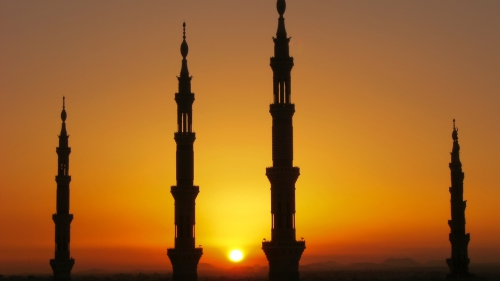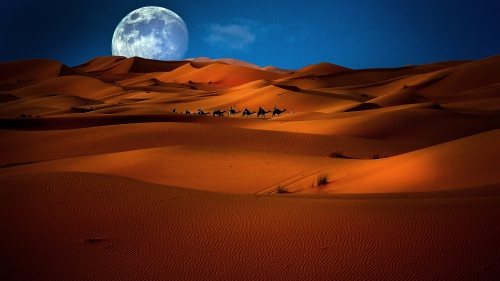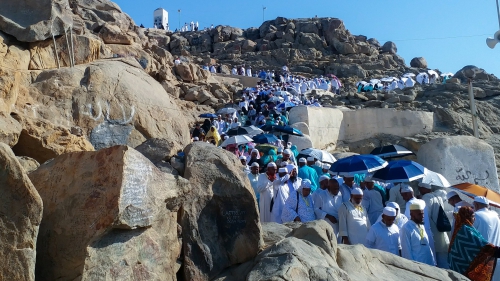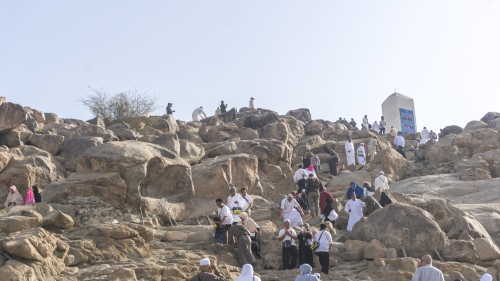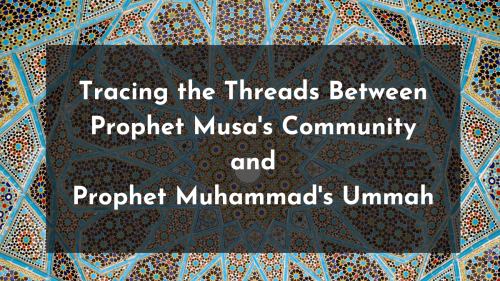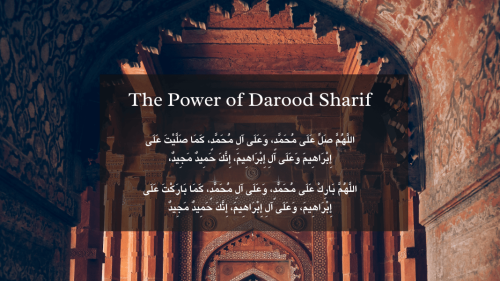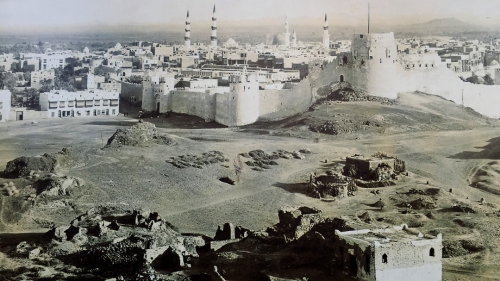Isra and Mi’raj (Part Two)
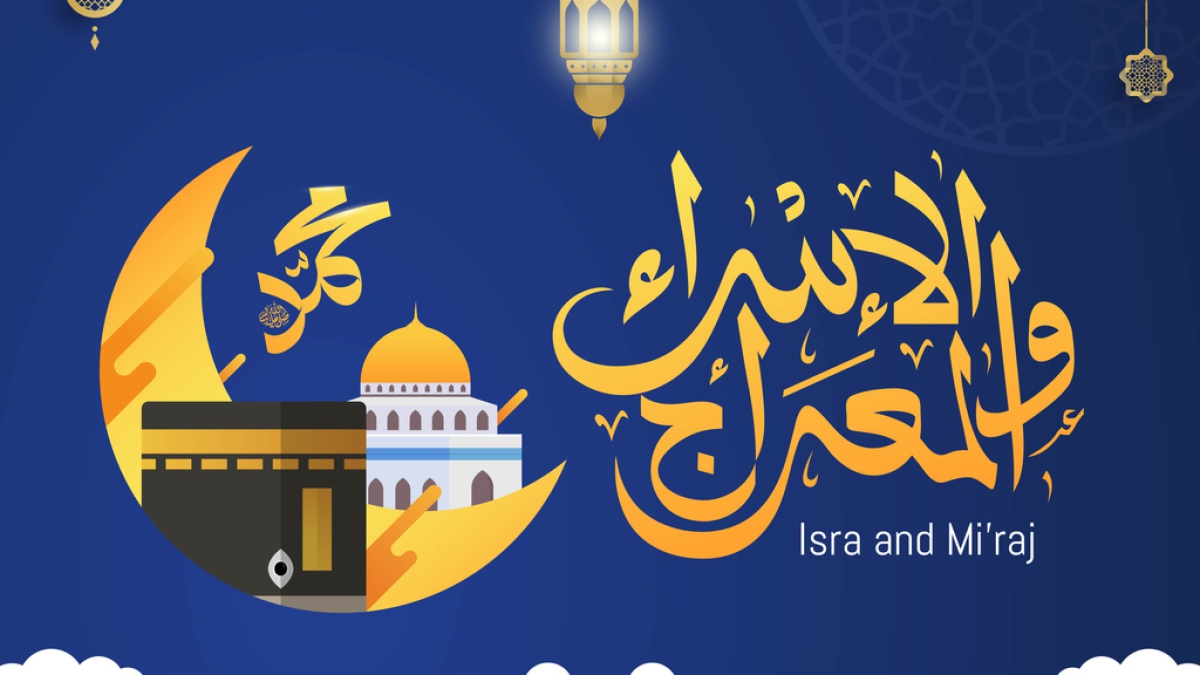
Isra and Mi’raj is usually divided into two phases. The tradition mentions that in its first phase the Prophet (PBUH) started on his journey from Makkah which ended in Jerusalem; and in its second phase of the journey the Prophet (PBUH) went from Jerusalem to the heavens. It is reported in narrations that after the Prophet (PBUH) had led all the previous Prophets (PBUH) into prayer, a ladder was presented to him via which the Archangel Gabriel led the Prophet (PBUH) to the heavens. In Arabic language Mi’raj means ladder and hence the name of this event. As mentioned before, our history and hadith books have given very detailed account of the event. All our past Imams and scholars have written about it and given considerable details about this event, such as:
“When the Prophet (PBUH) reached the first heaven then the angel guarding the door of the first heaven asked: Who is there? Gabriel replied, it is me. Then he asked: Who is with you? Gabriel replied: He is Muhammad (PBUH). Then he asked: Has he been invited? Gabriel replied, yes. Then the door opened and the Prophet (PBUH) was greeted profusely and he was introduced to angels and some great souls who were the residents of the first heaven. Among them, there was an elder personality who was a perfect model of human being with total facial and body symmetry, and without any trace of flaw anywhere. Gabriel told the Prophet (PBUH) that he is the very first person Adam, created by the Almighty. There were many persons on his right and left sides. When he saw those on the right he felt very happy. But when he saw those on the left then he felt very sad and he cried. The Prophet (PBUH) asked Gabriel, what is going on with him? Gabriel told that they are his progeny. When he sees the good and pious ones on his right side he feels very happy. But when he sees his bad progeny on his left he feels sad and he cries.
“The Prophet (PBUH) then saw a group of people harvesting a crop. The more they were cutting the crop the more it was growing. Then he asked Gabriel, what is going on here? Gabriel told that they are the Mujahedin who did Jihad in the way of Allah. Then the Prophet (PBUH) saw that there were people whose head was being crushed with stones. When the Prophet (PBUH) inquired about them then he was told that these are the people whose mental burden stopped them from praying. Then he saw people wearing patched clothes and were grazing grass like animals. He was told that they are those who did not pay Zakat from their wealth. Then the Prophet (PBUH) saw a person trying to lift a bundle of woods but could not lift it. Instead of removing some of the woods so that he could lift the bundle, he was putting more and more woods into the bundle and was trying to lift it and failing repeatedly. After seeing this the Prophet (PBUH) asked who is this inane person? He was told that this was the person who could not bear his responsibilities and trusts, but then instead of reducing them he kept on increasing them. Then the Prophet (PBUH) saw that there are some whose lips and tongues were being chopped off with scissors. Why was this being done to them? Because they used to gossip and spread rumors. At one place a bull came out from inside the crack of a stone and then tried to go back in through the crack but could not. The Prophet (PBUH) asked what is going on here? The reply came that this is an example of a person who was reckless and said insidious things and then felt sorry and wanted to retract but could not. At another place there were people cutting their own flesh and eating it. What is going on here? The Prophet (PBUH) was told these are the people who used to malign others....
“This continued until the Prophet (PBUH) and Gabriel reached the second heaven. The Prophet (PBUH) met Yahiya (PBUH) and Jesus (PBUH) there. On the third heaven there was a gentleman who was so handsome compared to common man as if he was full moon compared to stars. He was Yusuf (PBUH). On the fourth heaven the Prophet (PBUH) met Idris (PBUH), on the fifth heaven he met Harun (PBUH), on the sixth heaven he met Musa (PBUH). On the seventh heaven he saw a huge beautiful palace where there was heavy traffic of angels going in and out of the palace. The Prophet (PBUH) met there an elderly gentleman who looked like him. He was told that he is Prophet Ibrahim (PBUH). After further travel the Prophet (PBUH) reached Sidrat-ul-Muntaha. Everyone stops here. No further entry is allowed after this except by direct divine invitation. The Prophet (PBUH) was then shown the Jannah where such things were available which no one had seen nor heard nor even imagined before. At this place Gabriel stopped. The Prophet (PBUH) then went ahead alone and saw a grand lofty throne where Allah was sitting there. Allah and the Prophet (PBUH) conversed and Allah offered the following gifts to him: 50 obligatory prayers each day; the last two verses of Surah Al-Baqarah; everything will be forgiven except Shirk. He was told that if anyone intends to do good then he will get one reward for the intention and when he does it then he will get ten further rewards. However, if anyone intends to do bad and then does the bad thing then he will be charged with only one sin. After meeting Allah, the Prophet (PBUH) on his return journey met Musa (PBUH) and mentioned what Allah had offered him. At this Musa (PBUH) said: I have bitter experience with Israelites and your Ummah would not be able to fulfill 50 prayers each day. Please go and get it reduced. So the Prophet (PBUH) went and pleaded with Allah to reduce it. Allah then reduced it by ten. At this Musa (PBUH) again said that your Ummah would not be able to fulfill even this many. So, the Prophet (PBUH) went back and forth at the insistence of Musa (PBUH) until Allah reduced it to five daily prayers, which will count as equal to fifty.
“On the return journey the Prophet (PBUH) came down on the ladder to Bait-al Muqaddas (بیت المقدس) in Jerusalem. Again, all the previous messengers were present there. The Prophet (PBUH) led all of them in Fajr prayer and returned to Makkah on Buraq. When Prophet (PBUH) told about his journey then the Kuffar made fun of him, and this news quickly spread to all of Makkah. Many who had accepted Islam left it. Then the Prophet (PBUH) mentioned signs he encountered in this journey. He told Meccans: I passed through so and so caravans that were carrying such and such things; that the camels in one caravan were disturbed by the flight of Buraq and one camel ran away to such and such valley; and he told about it to the caravan leaders so that they could find it. He further told them: that on my return journey I found everyone sleeping in a caravan; so I went there and drank water from a bowl and left a sign there; and that caravan later found a proof of this. After these proofs provided by the Prophet (PBUH) everyone was convinced and became quiet….” [Maududi, Tarjumanul Quran, August 1951]
Musa (PBUH) and the number of prayers
There are differences in different narrations about when this event occurred; and there are differences in the account of where the Prophet (PBUH) was sleeping when he was awakened by Gabriel. Leaving aside these differences, let us take the role of Musa (PBUH) as reported in the narrations about getting the number of prayers reduced that Allah had offered the Prophet (PBUH). Since the Quran puts great emphasis on thinking and pondering (4:82), so much so that it says: وَالَّذِينَ إِذَا ذُكِّرُوا بِآيَاتِ رَبِّهِمْ لَمْ يَخِرُّوا عَلَيْهَا صُمًّا وَعُمْيَانًا
(25:73) – and who, whenever they are reminded of their Sustainer’s messages, do not throw themselves upon them [as if] deaf and blind. [Asad]
So, if that is the case with the Quran, then we should not throw ourselves deaf and blind upon ahadith – which were compiled after more than 200 years after the Prophet (PBUH) from a chain of oral narrations without any written record. We should not say:
وَإِذَا قِيلَ لَهُمُ اتَّبِعُوا مَا أَنزَلَ اللّهُ قَالُواْ بَلْ نَتَّبِعُ مَا أَلْفَيْنَا عَلَيْهِ آبَاءنَا
(2:170) – “Nay, we shall follow [only] that which we found our forefathers believing in and doing.” [Asad]
So, let us ponder on the above narration which mentions that Prophet (PBUH) was going back and forth between Allah and Musa (PBUH). It is clear from the narration that Allah didn’t know that Prophet’s Ummah would not be able to fulfill this obligation, but Musa (PBUH) knew that. And Allah, the All-knowledgeable, kept reducing the number of prayers at the suggestion of Musa (PBUH); and how the Prophet (PBUH) kept going back and forth between Allah and Musa (PBUH) to get the number of prayers reduced at his suggestion, so much so that some narrations mention that Musa (PBUH) suggested to the Prophet (PBUH) that his Ummah would not be able to fulfill even the five daily prayers, and at this the Prophet (PBUH) said that I feel ashamed to go to Allah now! One can see here how the narrators have tried to elevate the status of Musa (PBUH) compared to our Prophet (PBUH). The Quran, on the other hand, proclaims:
آمَنَ الرَّسُولُ بِمَا أُنزِلَ إِلَيْهِ مِن رَّبِّهِ وَالْمُؤْمِنُونَ ۚ كُلٌّ آمَنَ بِاللَّـهِ وَمَلَائِكَتِهِ وَكُتُبِهِ وَرُسُلِهِ لَا نُفَرِّقُ بَيْنَ أَحَدٍ مِّن رُّسُلِهِ (2:285) – THE APOSTLE, and the believers with him, believe in what has been bestowed upon him from on high by his Sustainer: they all believe in God, and His angels, and His revelations, and His apostles, making no distinction between any of His apostles. [Asad]
The status of the Prophet (PBUH)
The Quran is Allah’s last revelation which ended on Prophet Muhammad (PBUH). The Quran is the final Book of Allah and He Himself took the responsibility to protect it (15:9). Therefore, Islam is the last Deen until eternity. It is complete and unchangeable forever (6:115). The Quran has repeatedly instructed the people of the book to believe in its message and its messenger, the Prophet Muhammad (PBUH).
فَإِنْ آمَنُوا بِمِثْلِ مَا آمَنتُم بِهِ فَقَدِ اهْتَدَوا
(2:137) – And if [others] come to believe in the way you believe, they will indeed find themselves on the right path. [Asad]
Meeting with Allah
According to the narration, the Prophet (PBUH) went to meet with Allah who was sitting on His throne above the seventh heaven. What kind of picture one gets from this? Allah, the Almighty, the Creator of heavens and earth, was sitting on a fixed throne to meet the Prophet (PBUH) at a certain time! This brings forth the concept of “space and time.” But we know that space and time are related to only material things. The Quran has mentioned again and again that Allah is beyond space and time. It says:
هُوَ الْأَوَّلُ وَالْآخِرُ وَالظَّاهِرُ وَالْبَاطِنُ ۖ وَهُوَ بِكُلِّ شَيْءٍ عَلِيمٌ
(57:3) – He is the First and the Last, and the Outward as well as the Inward: and He has full knowledge of everything. [Asad]
Allah is beyond time and space. For Him there is no beginning and there is no end. He overpowers everything but His power is invisible and works unperceptively. Law is always invisible and non-physical. However, its results can be perceived; and it may be said that His attributes of creation and Sustenance are the visible manifestations of His Being. His being is invisible to the human eyes. In this way one can say that He is Transcendent and Imminent.
Every material thing comes into existence at some point in time and ends at some point in time. If it is present at some place it cannot be present at another place at the same time. Wherever it is, it occupies space. Let us think about it: that Allah being physically situated in space and time and the Prophet (PBUH) has to physically go there to meet with Him? When these facts are brought out in front of those who perpetuate this story, their response is that Allah has all the power to do anything. But this is not the question of power. It is the question of what kind of concept emerges of Allah from this story. This is completely against the concept of Allah as presented by the Quran. The Quran says:
وَإِذَا سَأَلَكَ عِبَادِي عَنِّي فَإِنِّي قَرِيبٌ
(2:186) – AND IF My servants ask thee about Me - behold, I am near [Asad]
So much close that:
وَنَحْنُ أَقْرَبُ إِلَيْهِ مِنْ حَبْلِ الْوَرِيدِ
(50:16) – for We are closer to him than his neck-vein. [Asad]
And:
وَهُوَ مَعَكُمْ أَيْنَ مَا كُنتُمْ
(57:4) – He is with you wherever you may be. [Asad]
Consequently, Allah was with the Prophet (PBUH) all the time. So, Allah being situated in a particular place and time is completely a wrong concept of Allah.
When Musa (PBUH) wanted to see God, he was told:
لَّا تُدْرِكُهُ الْأَبْصَارُ
(6:103) – No human vision can encompass Him. [Asad]
Human vision can see only material things. But God is beyond material attributes.
The Quran’s concept of God is beyond any material attributes; it is beyond human thought and imagination. If we look at all the religions of the world there is something material involved in God’s concept – either in the form of idols; or in the form of avatars; or as son of God; or God carrying a sword surrounded by angels and descending from lightning clouds to earth, and so on and so forth. The Quran’s concept of God is the only concept that is beyond material realm; it is beyond human vision and thought. According to the Quran, He is there wherever one may be; He is closer to one than one’s jugular vein; He is beyond human comprehension. There exists no physical attribute whatsoever associated with Him; He cannot be confined into space and time.
Topics: Gabriel (Jibril), Night Journey (Isra And Miraj), Prophet Muhammad (S), Prophets
Views: 7933
Related Suggestions







